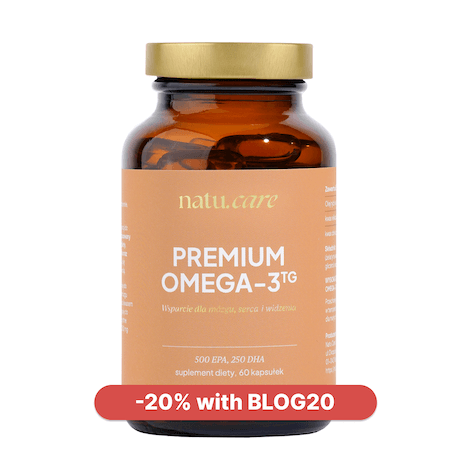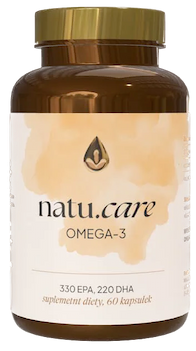- Home
- Omega acids
- DHA acid
DHA acid what it is, health properties, sources
DHA acid is one of the 'good fats' that we should provide to the body with our diet.


Learn more about our editorial process
.

Learn more about our editorial process
.

Learn more about our editorial process
.

Learn more about our editorial process
.
Why you can trust us
Articles on Natu.Care are written based on scientific research, data from government websites and other reliable sources. The texts are written in cooperation with doctors, nutritionists and other health and beauty experts. Articles are reviewed before publication and during significant updates.
.Learn more about our editorial process
.Information about advertisements
Content on Natu.Care may contain links to products from the sale of which we may receive a commission. When creating content, we adhere to high editorial standards and take care to be objective about the products discussed. The presence of affiliate links is not dictated by our partners, and we select the products we review ourselves completely independently.
.Learn more about our terms and Conditions
.DHA acid belongs to the group of omega-3 fatty acids and is an essential component for the proper functioning of our body. Find out what distinguishes DHA, exactly what properties it has and what are the indications for its use.
Omega-3 fatty acids are known for their health benefits for the brain and heart or prenatal development, among others. Each of these types of acids has unique functions. In this article, together with nutritionist Aleksandra Cudna, I will introduce you to the properties of DHA acid.
Description of contents
- Omega-3 acids vs DHA. We explain the division of the acids .
- DHA acid - properties and health-promoting effects .
- DHA and indications for use. Are you at risk of a deficiency .
- Symptoms of deficiency .
- DHA supplementation - recommendations .
- DHA acid - where does it occur? Sources of DHA in food
- DHA - where does it occur?
- DHA - take care of your diet! Advice from a nutritionist
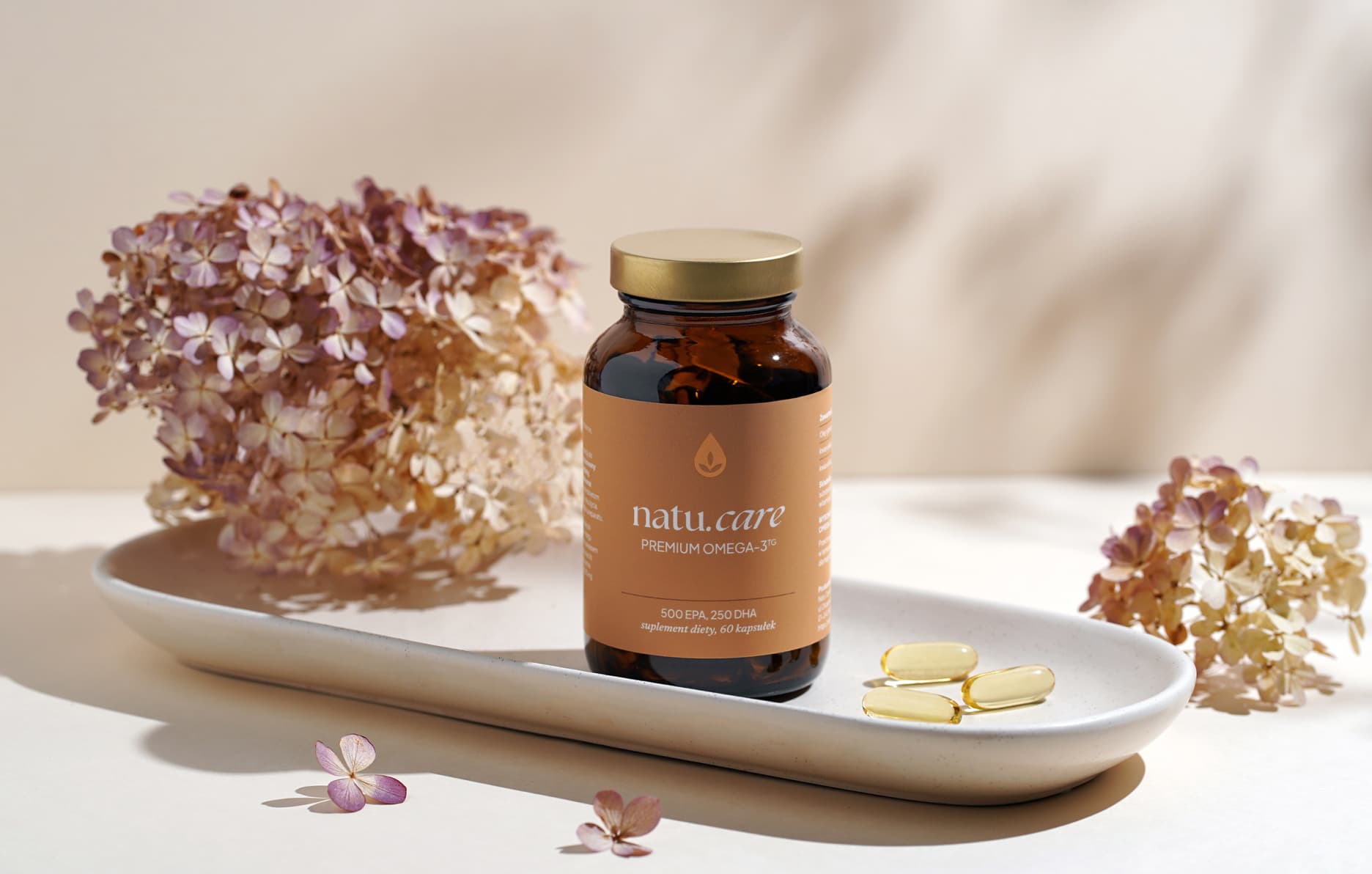
Sprawdź, za co pokochały go tysiące klientek Natu.Care Premium Omega-3ᵀᴳ -15% z kodem BLOG15
Natu.Care Omega-3ᵀᴳ Premium
Natu.Care Omega-3ᵀᴳ Premium dla zdrowia serca, mózgu i odporności. Najlepsza przyswajalność. Optymalna dawka 750 mg. Przebadana przez niezależne laboratorium.
Zobacz więcej
Produkt ma super skład, transparentną etykietę i co dla mnie jest ważne – małe kapsułki do połknięcia. Nie ma też nieprzyjemnego efektu odbijania rybą, który miałam spożywając inne produkty. Widzę znaczną poprawę odporności. Polecam!@Kasia P.
See also:
.- Omega acids .
- DHA acid in pregnancy
- EPA acid
- ALA acid
- Omega-3 fatty acids
- Omega-6 fatty acids
- Omega-9 fatty acids
- Omega-3 deficiency - symptoms .
- Omega-3 fatty acids for children .
- Omega-3 medicine, not a supplement .
- Omega 3-6-9 acids
- Omega-3 triglycerides .
DHA versus omega-3 fatty acids: a breakdown
.Acids omega-3, omega-6, omega-9, DHA, ALA, EPA... You can get confused, can't you? Alexandra Cudna explains the breakdown of fatty acids in simple terms so that you understand what omega-3 fatty acids are and what place DHA acid has in this system.
Fatty acids are divided into saturated and unsaturated fats. Among the unsaturated ones, we distinguish between monounsaturated and polyunsaturated fatty acids. Polyunsaturated fatty acids are omega-3 and omega-6. DHA acid is among the omega-3 fatty acidsand.
.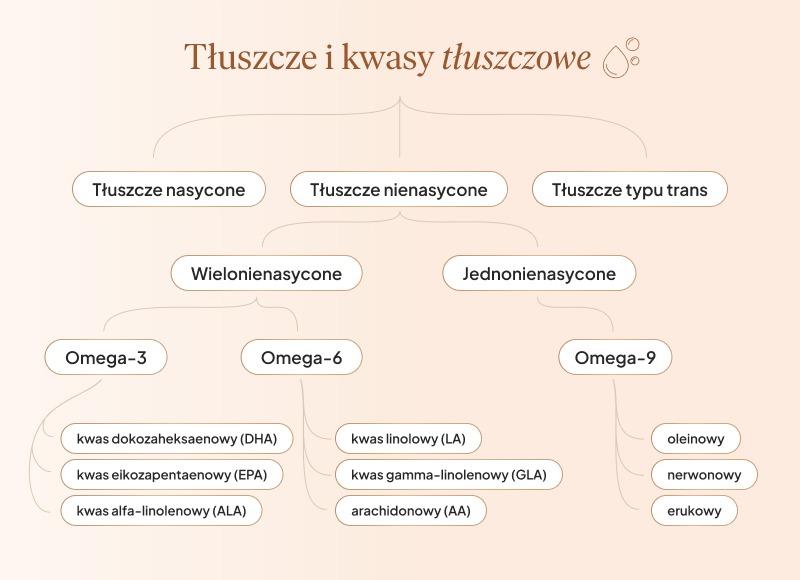
DHA acid - properties and health-promoting effects
.DHA acid has a multisystemic effect on our health. How does it act on our body?
- Body: It is part of every cell in our body and an important structural component of the skin, eyes and brain. Proper concentrations maintained as early as prenatal life support the healthy development of the whole bodyand. .
- Nervous system: Regulates the function of nerve cells and ensures the formation of an adequate number of connections between neurons. Has a positive effect on the intellectual, psychomotor and cognitive development of the child. Higher levels of DHA in the blood are associated with a reduced risk of dementia and Alzheimer's diseaseand.
- Immune system: DHA helps the body fight ongoing inflammation and may help repair and heal tissues. Studies also show that it can inhibit the growth of cancer cellsand. .
- Cardiovascular system: DHA can reduce the risk of heart disease by, among other things, lowering triglycerides and blood pressure. However, its role in preventing heart disease requires further researchand.
- Bone system: May relieve pain and inflammation associated with arthritis, arthritis .
- Muscular system: Has the potential to reduce muscle soreness and muscle recovery after exercise .
- Respiratory system: DHA may alleviate asthma symptoms, possibly by blocking mucus secretion and lowering blood pressureand. .
- Pregnancy: Reduces the risk of premature birth, determines the correct weight of the baby, reduces the risk of pre-eclampsia, reduces the risk of postnatal depression .
- Organ of vision: Helps activate rhodopsin, a membrane protein in the rods of the eyes. Rhodopsin helps the brain perceive images by altering the permeability, fluidity and thickness of the eye's membranesand.
- Mental health: Studies show that DHA deficiency in early life is associated with learning disabilities, ADHD, aggressive hostility. Proper levels of DHA may protect against depressionand.
As you can see: it is worthwhile to take care of an adequate concentration of omega-3 fatty acids (including DHA) in the body. Here is a summary of the most valuable products with these ingredients: Omeega-3 acids in tablets: ranking of the best products
Product description
The dietary supplement contains omega-3ᵀᴳ, or omega-3 acids in the form of trójglyceridesów. Scientific studies suggest that this form of fatty acidsós up to 2 times better absorbed than the estersós present in many dietary supplements on the market. This means that you are assured of their effectiveness and of supplying yourself with valuable omega acids.
Fatty acids omega-3 are derived from wild anchovy oil. It is a rich source of healthy fats that are essential for the health of the cardiovascular, immune and nervous systems, as well as the proper function of vision, joints muscles.
Scientific research suggests that wild anchovies are a good source of healthy fats.
Scientific research also suggests that an adequate intake of omega-3 fatty acidsós protects against and supports the treatment of depression and anxiety disorders. In addition, omega-3s influence the hydration and appearance of the skinóry and support healthy sleep.
.
The formula contains a total of 750 mg of EPA+DHA acidsós, which is three times higher than the recommended minimum of 250 mg for the Polish population. Omega-3 TG Premium has studies indicating that its TOTOX is 9, which is a very good result.
Supplementation of omega-3 fatty acidsóis recommended for anyone who does not eat 1–2 portions (approximately 300 g) of oily fish per week. Children during growth, seniors, physically active people, vegans and vegetarians, as well as patients undergoing cardiovascular treatment and prevention of heart disease also have an increased need.
Pros and cons
The dietary supplement contains omega-3ᵀᴳ, or omega-3 acids in the form of trójglyceridesów. Scientific studies suggest that this form of fatty acidsós up to 2 times better absorbed than the estersós present in many dietary supplements on the market. This means that you are assured of their effectiveness and of supplying yourself with valuable omega acids.
Fatty acids omega-3 are derived from wild anchovy oil. It is a rich source of healthy fats that are essential for the health of the cardiovascular, immune and nervous systems, as well as the proper function of vision, joints muscles.
Scientific research suggests that wild anchovies are a good source of healthy fats.
Scientific research also suggests that an adequate intake of omega-3 fatty acidsós protects against and supports the treatment of depression and anxiety disorders. In addition, omega-3s influence the hydration and appearance of the skinóry and support healthy sleep.
.
The formula contains a total of 750 mg of EPA+DHA acidsós, which is three times higher than the recommended minimum of 250 mg for the Polish population. Omega-3 TG Premium has studies indicating that its TOTOX is 9, which is a very good result.
Supplementation of omega-3 fatty acidsóis recommended for anyone who does not eat 1–2 portions (approximately 300 g) of oily fish per week. Children during growth, seniors, physically active people, vegans and vegetarians, as well as patients undergoing cardiovascular treatment and prevention of heart disease also have an increased need.
Additional information
The dietary supplement contains omega-3ᵀᴳ, or omega-3 acids in the form of trójglyceridesów. Scientific studies suggest that this form of fatty acidsós up to 2 times better absorbed than the estersós present in many dietary supplements on the market. This means that you are assured of their effectiveness and of supplying yourself with valuable omega acids.
Fatty acids omega-3 are derived from wild anchovy oil. It is a rich source of healthy fats that are essential for the health of the cardiovascular, immune and nervous systems, as well as the proper function of vision, joints muscles.
Scientific research suggests that wild anchovies are a good source of healthy fats.
Scientific research also suggests that an adequate intake of omega-3 fatty acidsós protects against and supports the treatment of depression and anxiety disorders. In addition, omega-3s influence the hydration and appearance of the skinóry and support healthy sleep.
.
The formula contains a total of 750 mg of EPA+DHA acidsós, which is three times higher than the recommended minimum of 250 mg for the Polish population. Omega-3 TG Premium has studies indicating that its TOTOX is 9, which is a very good result.
Supplementation of omega-3 fatty acidsóis recommended for anyone who does not eat 1–2 portions (approximately 300 g) of oily fish per week. Children during growth, seniors, physically active people, vegans and vegetarians, as well as patients undergoing cardiovascular treatment and prevention of heart disease also have an increased need.
Expert opinion
The dietary supplement contains omega-3ᵀᴳ, or omega-3 acids in the form of trójglyceridesów. Scientific studies suggest that this form of fatty acidsós up to 2 times better absorbed than the estersós present in many dietary supplements on the market. This means that you are assured of their effectiveness and of supplying yourself with valuable omega acids.
Fatty acids omega-3 are derived from wild anchovy oil. It is a rich source of healthy fats that are essential for the health of the cardiovascular, immune and nervous systems, as well as the proper function of vision, joints muscles.
Scientific research suggests that wild anchovies are a good source of healthy fats.
Scientific research also suggests that an adequate intake of omega-3 fatty acidsós protects against and supports the treatment of depression and anxiety disorders. In addition, omega-3s influence the hydration and appearance of the skinóry and support healthy sleep.
.
The formula contains a total of 750 mg of EPA+DHA acidsós, which is three times higher than the recommended minimum of 250 mg for the Polish population. Omega-3 TG Premium has studies indicating that its TOTOX is 9, which is a very good result.
Supplementation of omega-3 fatty acidsóis recommended for anyone who does not eat 1–2 portions (approximately 300 g) of oily fish per week. Children during growth, seniors, physically active people, vegans and vegetarians, as well as patients undergoing cardiovascular treatment and prevention of heart disease also have an increased need.
Product description
The dietary supplement contains high-quality fatty acids omega-3 from anchovy oil. It is a naturally rich source of healthy fats that are essential for cardiovascular, immune and nervous system health, as well as proper function of eyesight, joints muscles.
Scientific research also suggests that an adequate intake of omega-3 fatty acidsós protects against and supports the treatment of depression and anxiety disorders. In addition, omega-3s influence the hydration and appearance of the skinóry and support healthy sleep.
.
The dietary supplement contains 550 mg EPA+DHA per daily serving. This is more than double the official recommendations for the Polish population, whichóre suggesting an intake of at least 250 mg per day.
Supplementation of EPA+DHA is a good way to support healthy sleep.
Supplementation with omega-3 fatty acidsós is advisable if you do not consume 1–2 portions (approx. 300 g) of oily fish per week. There is also an increased need for physically active people, vegans and vegetarians, seniors, children during growth spurts and patients undergoing cardiovascular treatment and prevention of heart disease.
Pros and cons
The dietary supplement contains high-quality fatty acids omega-3 from anchovy oil. It is a naturally rich source of healthy fats that are essential for cardiovascular, immune and nervous system health, as well as proper function of eyesight, joints muscles.
Scientific research also suggests that an adequate intake of omega-3 fatty acidsós protects against and supports the treatment of depression and anxiety disorders. In addition, omega-3s influence the hydration and appearance of the skinóry and support healthy sleep.
.
The dietary supplement contains 550 mg EPA+DHA per daily serving. This is more than double the official recommendations for the Polish population, whichóre suggesting an intake of at least 250 mg per day.
Supplementation of EPA+DHA is a good way to support healthy sleep.
Supplementation with omega-3 fatty acidsós is advisable if you do not consume 1–2 portions (approx. 300 g) of oily fish per week. There is also an increased need for physically active people, vegans and vegetarians, seniors, children during growth spurts and patients undergoing cardiovascular treatment and prevention of heart disease.
Additional information
The dietary supplement contains high-quality fatty acids omega-3 from anchovy oil. It is a naturally rich source of healthy fats that are essential for cardiovascular, immune and nervous system health, as well as proper function of eyesight, joints muscles.
Scientific research also suggests that an adequate intake of omega-3 fatty acidsós protects against and supports the treatment of depression and anxiety disorders. In addition, omega-3s influence the hydration and appearance of the skinóry and support healthy sleep.
.
The dietary supplement contains 550 mg EPA+DHA per daily serving. This is more than double the official recommendations for the Polish population, whichóre suggesting an intake of at least 250 mg per day.
Supplementation of EPA+DHA is a good way to support healthy sleep.
Supplementation with omega-3 fatty acidsós is advisable if you do not consume 1–2 portions (approx. 300 g) of oily fish per week. There is also an increased need for physically active people, vegans and vegetarians, seniors, children during growth spurts and patients undergoing cardiovascular treatment and prevention of heart disease.
Expert opinion
The dietary supplement contains high-quality fatty acids omega-3 from anchovy oil. It is a naturally rich source of healthy fats that are essential for cardiovascular, immune and nervous system health, as well as proper function of eyesight, joints muscles.
Scientific research also suggests that an adequate intake of omega-3 fatty acidsós protects against and supports the treatment of depression and anxiety disorders. In addition, omega-3s influence the hydration and appearance of the skinóry and support healthy sleep.
.
The dietary supplement contains 550 mg EPA+DHA per daily serving. This is more than double the official recommendations for the Polish population, whichóre suggesting an intake of at least 250 mg per day.
Supplementation of EPA+DHA is a good way to support healthy sleep.
Supplementation with omega-3 fatty acidsós is advisable if you do not consume 1–2 portions (approx. 300 g) of oily fish per week. There is also an increased need for physically active people, vegans and vegetarians, seniors, children during growth spurts and patients undergoing cardiovascular treatment and prevention of heart disease.
ALLNUTRITION Omega 3 Strong
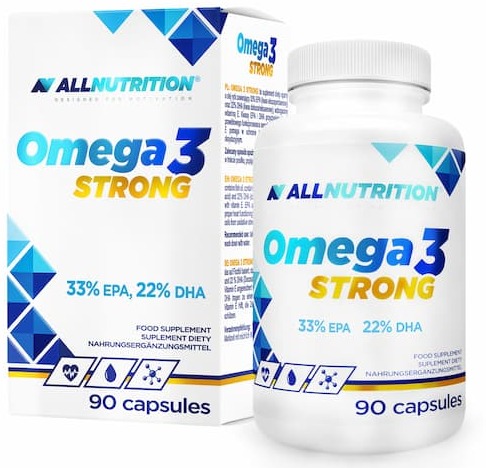
- Content omega-3 acids: 550 mg (DHA 220 mg + EPA 330 mg)
- Additional active ingredients: vitamin E
- Form: capsules .
- Dose: 1 capsule per day .
- Sufficient for: 90 days .
Product description
A dietary supplement with a solid portion of DHA and EPA – valuable for health and well-being omega-3 acidsós. Indicated especially for people on a plant-based diet, physically active people and seniors.
.The sourceóof omega-3 acids in this preparation is fish oil.
.Pros and cons
A dietary supplement with a solid portion of DHA and EPA – valuable for health and well-being omega-3 acidsós. Indicated especially for people on a plant-based diet, physically active people and seniors.
.The sourceóof omega-3 acids in this preparation is fish oil.
.Additional information
A dietary supplement with a solid portion of DHA and EPA – valuable for health and well-being omega-3 acidsós. Indicated especially for people on a plant-based diet, physically active people and seniors.
.The sourceóof omega-3 acids in this preparation is fish oil.
.User review
A dietary supplement with a solid portion of DHA and EPA – valuable for health and well-being omega-3 acidsós. Indicated especially for people on a plant-based diet, physically active people and seniors.
.The sourceóof omega-3 acids in this preparation is fish oil.
.Solgar Omega 3-6-9
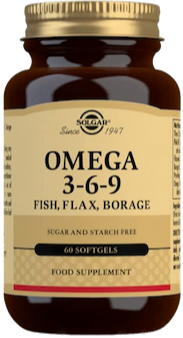
- Content of omega acids:.
- Omega-3 fatty acids.
- Omega-3 fatty acids
- alpha-linolenic acid (ALA) – 585 mg
.- eicosapentaenoic acid (EPA) – 344 mg
- docosahexaenoic acid (DHA) – 221 mg
.
- Omega-3 fatty acids
- Omega-6 fatty acids.
- linoleic acid (LA) – 598 mg .
- gamma-linolenic acid (GLA) – 274 mg .
- Omega-9 fatty acids.
- Oleic acid – 325 mg .
- Omega-3 fatty acids.
- Source of omega acids: fish oil from anchovies, mackerel, sardines, linseed oil, cucumber oil .
- Form: capsules .
- Packaging: 60 capsules .
- Daily allowance:3 capsules per day .
- Sufficient for: 20 days .
Product description
A combination of omega 3-6-9 fatty acidsós derived from fish and plants. The dietary supplement supplements essential omega fatty acids, whichóre needed for the proper functioning of many systemsóorgansóin the body.
Pros and cons
A combination of omega 3-6-9 fatty acidsós derived from fish and plants. The dietary supplement supplements essential omega fatty acids, whichóre needed for the proper functioning of many systemsóorgansóin the body.
Additional information
A combination of omega 3-6-9 fatty acidsós derived from fish and plants. The dietary supplement supplements essential omega fatty acids, whichóre needed for the proper functioning of many systemsóorgansóin the body.
A combination of omega 3-6-9 fatty acidsós derived from fish and plants. The dietary supplement supplements essential omega fatty acids, whichóre needed for the proper functioning of many systemsóorgansóin the body.
Omega + Vitamin D3 800 IU for children
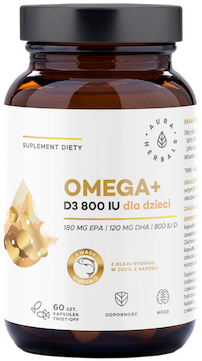
- Content of omega-3 fatty acids: 300 mg (180 mg EPA + 120 mg DHA)
- .
- Additional active ingredients: vitamin D3
- Form: twist-off capsules
- .
- Dose: 1 capsule per day
- .
- Sufficient for: 60 days
- .
Product description
Omega-3 acids for children with added vitamin D3 in good doses. The formula fills the daily requirement of EPA and DHA and vitamin D for children aged 2–18 years.
The Ministry of Health recommends supplementation with vitamin D3. In turn, omega-3 fatty acids are also crucial for the youngest.
The dietary supplement from Aura Herbals supports mós brain function, proper vision and immune system function.
The omega-3 fatty acids are derived from fish oil sourced from anchovies.
Pros and cons
Omega-3 acids for children with added vitamin D3 in good doses. The formula fills the daily requirement of EPA and DHA and vitamin D for children aged 2–18 years.
The Ministry of Health recommends supplementation with vitamin D3. In turn, omega-3 fatty acids are also crucial for the youngest.
The dietary supplement from Aura Herbals supports mós brain function, proper vision and immune system function.
The omega-3 fatty acids are derived from fish oil sourced from anchovies.
Additional information
Omega-3 acids for children with added vitamin D3 in good doses. The formula fills the daily requirement of EPA and DHA and vitamin D for children aged 2–18 years.
The Ministry of Health recommends supplementation with vitamin D3. In turn, omega-3 fatty acids are also crucial for the youngest.
The dietary supplement from Aura Herbals supports mós brain function, proper vision and immune system function.
The omega-3 fatty acids are derived from fish oil sourced from anchovies.
User review
Omega-3 acids for children with added vitamin D3 in good doses. The formula fills the daily requirement of EPA and DHA and vitamin D for children aged 2–18 years.
The Ministry of Health recommends supplementation with vitamin D3. In turn, omega-3 fatty acids are also crucial for the youngest.
The dietary supplement from Aura Herbals supports mós brain function, proper vision and immune system function.
The omega-3 fatty acids are derived from fish oil sourced from anchovies.
DHA versus indications for use. Are you at risk of deficiency?
.The human body does not produce DHA, it must be supplied from food or dietary supplements. Supplementation is recommended for anyone who wants to naturally support their body to function healthily, but who does not eat adequate amounts of fish. We should eat 1-2 portions of fish per week..
 .
.
Aleksandra Cudna Clinical nutritionist
Who in particular should be concerned about supplementation
.Pregnant women
.DHA is one of the most important fatty acids for building human neural tissue. An adequate supply of DHA during pregnancy plays a key role in the proper development of the baby's nervous system during prenatal lifeand.
See also:
.Breastfeeding women
.My pregnant patients supplement DHA acids as one of several dedicated preparations. Unfortunately, it is common for women to discontinue further supplementation after the end of their pregnancy. It is important to remember that until 6 months of age, the infant obtains DHA acids by relying on breast milk, which is why continued supplementation is so important..
 .
.
Aleksandra CudnaClinical nutritionist
Women should continue DHA supplementation even after giving birth. DHA will help the body recover during the postpartum period, and the baby will obtain the acid from breast milk and develop properlyand.
Infants
.DHA is crucial for infants as it influences the proper course of their intensive growth and intellectual development. It is worth being mindful of your diet (breastfeeding mothers) or getting DHA-fortified modified milk to ensure consistent, healthy concentrations of this acidand.
Vegans and vegetarians
.Because of their diet, those on a plant-based diet are at risk of deficiency. Vegans and vegetarians should take DHA in the form of oils from certain species of biotech-derived algae, otherwise they will not be able to meet the requirement from other plant sources.
.. .
Aleksandra Cudna Clinical nutritionist
Symptoms of deficiency
.An omega-3 fatty acid deficiency means that your body is not getting enough omega-3 fatty acids, which can put you at risk of negative health effectsand.
Major symptoms of omega-3 fatty acid deficiency, including DHAand:
.- Skin: Dryness, irritation, acne lesions, feeling of skin tightness, cracked skin on heels.
- Hair: Fallout, dryness of the scalp, dandruff.
- Nails: Fragile, brittle, splitting.
- Ears.
- Ears: Excessive secretion of earwax. .
- Eyes: Dry eyes. .
- Muscles: Soreness, tension, cramps.
- Muscles.
- Mind: Decreased concentration, memory problems, mood disorders (e.g. depressive symptoms, nervousness).
- Resilience.
- Resistance: Frequent infections, prolonged inflammation. .
DHA supplementation - recommendations
.Deficiency of omega-3 fatty acids, including DHA is common worldwide.
In the table below you will find recommendations for dietary intake of DHA acid according to age/stage in lifeand.
.|
Who . |
Recommended intake of DHA . |
||
|
Woman preparing for pregnancy | |||
| . |
200 mg/day if diet is rich in fish and seafood . 400 mg/day if diet is not rich in fish and seafood |
||
|
Pregnant woman . |
200 mg/day if diet is rich in fish and seafood . 400 mg/day if the diet does not contain fish and seafood
1000 mg/day if there is a risk of preterm birth |
||
|
Breastfeeding women |
200 mg/day if diet is rich in fish and seafood . 400- 600 mg/day if the diet is not rich in fish and seafood |
||
|
Breastfed infant up to 6 months | |||
| . |
If the mother consumes DHA, she provides it to the baby directly in the milk | . | |
|
Infant up to the 6th month fed with modified milk |
Milk replacers are compulsorily enriched with DHA, so no supplementation is necessary | Infant formula. |
|
|
Infant after 6 months, during the expansion of the diet | |||
| . |
Breastfed: if not consuming at least 1 portion of fish per week, DHA supplementation needed
Modified milk fed: calculate how much DHA the child is getting in the milk replacer mix and if he/she is not consuming fish, consider supplementation |
||
|
Children 12-24 months of age |
100 mg/day or a portion of oily fish 1-2 x per week |
||
|
Children from 2 years of age, adolescents and adults |
250 mg/day DHA+EPA or a portion of oily fish 1-2 x per week |
DHA in capsules, tablet or liquid?
.There are various forms of DHA acid available on the market. Most often, all you need to do is buy a product that signs itself as omega-3. Capsules, liquids and even jellies are available. Manufacturers are increasingly emphasising the lack of fish odour in their products, which is a plus if someone doesn't like it.
When supplementing with DHA, it is a good idea to take it with a meal in the presence of healthy fats to ensure the best absorption..
 .
.
Aleksandra Cudna Clinical nutritionist
DHA testing
.If you are considering DHA supplementation, it is worth looking at your diet. You may find that your menu is rich in fish and seafood, so consuming tablets will be unnecessary. However, if in doubt, take a blood test and check the concentration of DHA in your bodyand.
Contraindications to DHA supplementation. Who should be careful?
.Sensitivity to the active ingredient or any of the excipients of a particular supplement should be considered. People with clotting disorders blood and liver failure and women using hormonal contraceptionand should also be particularly cautious.
DHA overdose - is it even possible?
.Remember that more is not better. Taking too much DHA can result in unpleasant symptoms and can harm usand.
Symptoms of DHA overdose:
.- nose bleeding, gum bleeding , .
- increased blood sugar levels in people with diabetes ,
- lowering blood pressure ,
- relaxation, stomach problems, nausea , .
Supplementation with omega-3 is relatively safe compared to other supplements. It is worth choosing DHA of the highest quality, obtained from fish living in a safe and low-pollution environment.
DHA acid - where does it occur? Sources of DHA in food
.The human body does not produce DHA, so this acid must be supplied from food or dietary supplements.
Sources of DHA acid in foodand:
- hair, .
- fork, .
- tuna, .
- trout,
- small fish,
- ostrils, .
- cra, .
- marinated herring, .
- small fish, .
- snow crab, .
- spirulina, .
- algae, seaweed; .
Fish? They are contaminated and dangerous! Are they for sure?"
.Many of my patients react with reluctance to the recommendation to increase the amount of fish in their diet. They fear their contamination with heavy metals. Let us remember that fish of Asian origin (e.g. butterfish, panga) and predatory fish (e.g. swordfish, shark), which are not very popular on the Polish market and do not form the basis of our diet, are characterised by the highest contamination. It is also worth mentioning that the benefits of eating fish still outweigh the risks associated with their consumption. In addition, we can buy MSC-certified fish, which ensures sustainable fish management that saves the environment..
 .
.
Aleksandra Cudna Clinical nutritionist
Eating fish during pregnancy - is it safe?
.Pregnant women often wonder if they can eat fish. Yes, they can! When choosing fish, they should follow two rules:
- The fish should come from a reliable source - the best fish are caught in the Pacific, Atlantic and North Sea, non-predatory and fatty.
- The fish should be as good as possible.
- Fish should have as few harmful substances as possible. Examples of such fish are: Norwegian salmon, trout, sardine, herring, pollock. .
DHA - take care of your diet. Advice from a nutritionist
.Genuine levels of DHA, which belongs to the valuable omega-3 fatty acids, are needed for us to function healthily. Some advice from our expert to ensure you get the correct amount of this acid and realise its potentialand:
- Try to enrich your menu with fish and seafood. These foods can be eaten in a variety of ways, such as by steaming, preparing spreads or composing into salads.
- If you like the taste of fish and seafood, it's a great way to eat it.
- If you don't like fish and seafood in your diet, why not try algae or algae? It's a great opportunity to taste something new in the kitchen! .
- Experiment with spices. Look out for curcumin. The curcumin contained in it increases the concentration of DHA.
- If you can't swallow fish, and algae or algae are not your tastes, consider supplementation. A good DHA supplement should be short and preferably contain cod liver oil rather than fish oil, which will not be a good source of omega-3. .
See also:
- Guide: choose the best omega-3 .
- Omega-3 in tablets - ranking
- Omega-3 in an athlete's diet
- Tran
- Vitamin D deficiency
- Vitamin B12 deficiency
- Collagen deficiency .
Summary
.DHA acid, which belongs to the omega-3 group, has multiple health-promoting effects on our bodies from prenatal life. It is extremely important to look at your diet and find room in it for sources of DHA. Properly selected fish is a healthy and nutritious source of essential acids in our diet.
Do you eat fish? Which ones do you eat most often in your diet? Leave a comment, I'm curious! And if you have questions - write, we'll answer them with an expert.
I invite you to other interesting posts about vitamins and minerals.
FAQ
.How much daily intake of DHA + EPA acids?
.The average adult should consume 250 mg per day of DHA+EPA from dietary supplements or eat a portion of oily fish 1-2 times a week. Good dietary supplements include, for example, Natu.Care Premium Omega-3 TG. From food, bet on oily fish containing 7-15% fat, such as salmon, mackerel, herring or sardines.
Can DHA be overdosed?
.Yes, it is possible to overdose on DHA acids, but this is a very rare occurrence and most often happens through over-supplementation. The body naturally gets rid of excess omega acids. It is impossible to overdose on DHA from food.
Does DHA cross into milk?
.Yes, DHA acids consumed by a breastfeeding woman penetrate the breastmilk, therefore the need for DHA increases during this period. A breastfeeding mother can supplement with omega-3 fatty acids or incorporate sources of them into a nutritious and varied diet.
Is DHA a tranic acid?
.Tran contains omega-3 fatty acids - DHA and EPA. The name cod-liver oil covers only the liver oil of cod and cod fish. Dietary supplements described as omega-3 contain oils from other fish (e.g. anchovies, sardines, shark liver). They must not use the name tran.
Where is the most DHA found?
.The most DHA acid is contained in oily marine fish (their fatty tissue is 7-15% fat). The highest content is found in mackerel, salmon, trout and sardines.
Is DHA an omega-3?
.DHA (docosahexaenoic acid) belongs to the group of omega-3 unsaturated fatty acids. They are essential for the body to function properly and must be supplied from the diet.
Does DHA make you fat?
.DHA acid belongs to the group of omega-3 acids and is one of the fats that have 9 kcal in 1 g. If you consume a lot of fats from foods and exceed your daily calorie requirements, you may gain weight. Supplementation with omega-3 fatty acids (including DHA) is not calorific - one capsule has about 10 kcal.
Sources
.See all
.Amjad Khan, W., Chun-Mei, H., Khan, N., Iqbal, A., Lyu, S.-W., & Shah, F. (2017). Bioengineered Plants Can Be a Useful Source of Omega-3 Fatty Acids. BioMed Research International, 2017, 7348919. https://doi.org/10.1155/2017/7348919
Anderson, G. J., Connor, W. E., & Corliss, J. D. (1990). Docosahexaenoic acid is the preferred dietary n-3 fatty acid for the development of the brain and retina. Pediatric Research, 27(1), 89-97. https://doi.org/10.1203/00006450-199001000-00023
Austria, J. A., Richard, M. N., Chahine, M. N., Edel, A. L., Malcolmson, L. J., Dupasquier, C. M. C., & Pierce, G. N. (2008). Bioavailability of alpha-linolenic acid in subjects after ingestion of three different forms of flaxseed. Journal of the American College of Nutrition, 27(2), 214-221. https://doi.org/10.1080/07315724.2008.10719693
Balbás, G. M., Regaña, M. S., & Millet, P. U. (2011). Study on the use of omega-3 fatty acids as a therapeutic supplement in treatment of psoriasis. Clinical, Cosmetic and Investigational Dermatology, 4, 73-77. https://doi.org/10.2147/CCID.S17220
Callaway, J., Schwab, U., Harvima, I., Halonen, P., Mykkänen, O., Hyvönen, P., & Järvinen, T. (2005). Efficacy of dietary hempseed oil in patients with atopic dermatitis. The Journal of Dermatological Treatment, 16(2), 87-94. https://doi.org/10.1080/09546630510035832
Carlson, S. E., Gajewski, B. J., Alhayek, S., Colombo, J., Kerling, E. H., & Gustafson, K. M. (2018). Dose-response relationship between docosahexaenoic acid (DHA) intake and lower rates of early preterm birth, low birth weight and very low birth weight. Prostaglandins, Leukotrienes, and Essential Fatty Acids, 138, 1-5. https://doi.org/10.1016/j.plefa.2018.09.002
Chandrasekhar, K., Kapoor, J., & Anishetty, S. (2012). A Prospective, Randomized Conquer, J. A., & Holub, B. J. (1996). Supplementation with an algae source of docosahexaenoic acid increases (n-3) fatty acid status and alters selected risk factors for heart disease in vegetarian subjects. The Journal of Nutrition, 126(12), 3032-3039. https://doi.org/10.1093/jn/126.12.3032
Db, M., S, S., & Kr, M. (2018). Role of Piperine as an Effective Bioenhancer in Drug Absorption. Pharmaceutica Analytica Acta, 09(07). https://doi.org/10.4172/2153-2435.1000591
de Wilde, M. C., Vellas, B., Girault, E., Yavuz, A. C., & Sijben, J. W. (2017). Lower brain and blood nutrient status in Alzheimer's disease: Results from meta-analyses. Alzheimer's & Dementia: Translational Research & Clinical Interventions, 3(3), 416-431. https://doi.org/10.1016/j.trci.2017.06.002
Downie, L. E., Gad, A., Wong, C. Y., Gray, J. H. V., Zeng, W., Jackson, D. C., & Vingrys, A. J. (2018). Modulating Contact Lens Discomfort With Anti-Inflammatory Approaches: A Randomized Controlled Trial. Investigative Ophthalmology & Visual Science, 59(8), 3755-3766. https://doi.org/10.1167/iovs.18-24758
Downie, L. E., & Vingrys, A. J. (2018). Oral Omega-3 Supplementation Lowers Intraocular Pressure in Normotensive Adults. Translational Vision Science & Technology, 7(3), 1. https://doi.org/10.1167/tvst.7.3.1
Dyall, S. C. (2015). Long-chain omega-3 fatty acids and the brain: A review of the independent and shared effects of EPA, DPA and DHA. Frontiers in Aging Neuroscience, 7, 52. https://doi.org/10.3389/fnagi.2015.00052
Eslick, G. D., Howe, P. R. C., Smith, C., Priest, R., & Bensoussan, A. (2009). Benefits of fish oil supplementation in hyperlipidemia: A systematic review and meta-analysis. International Journal of Cardiology, 136(1), 4-16. https://doi.org/10.1016/j.ijcard.2008.03.092
Fokkema, M. R., Brouwer, D. A., Hasperhoven, M. B., Martini, I. A., & Muskiet, F. A. (2000). Short-term supplementation of low-dose gamma-linolenic acid (GLA), alpha-linolenic acid (ALA), or GLA plus ALA does not augment LCP omega 3 status of Dutch vegans to an appreciable extent. Prostaglandins, Leukotrienes, and Essential Fatty Acids, 63(5), 287-292. https://doi.org/10.1054/plef.2000.0216
Gerster, H. (1998). Can adults adequately convert alpha-linolenic acid (18:3n-3) to eicosapentaenoic acid (20:5n-3) and docosahexaenoic acid (22:6n-3)? International Journal for Vitamin and Nutrition Research. Internationale Zeitschrift Fur Vitamin- Und Ernahrungsforschung. Journal International De Vitaminologie Et De Nutrition, 68(3), 159-173.
Gupta, R. K., Patel, A. K., Shah, N., Chaudhary, A. K., Jha, U. K., Yadav, U. C., Gupta, P. K., & Pakuwal, U. (2014). Oxidative stress and antioxidants in disease and cancer: A review. Asian Pacific Journal of Cancer Prevention: APJCP, 15(11), 4405-4409. https://doi.org/10.7314/apjcp.2014.15.11.4405
Hansen, A. L., Dahl, L., Olson, G., Thornton, D., Graff, I. E., Frøyland, L., Thayer, J. F., & Pallesen, S. (2014). Fish Consumption, Sleep, Daily Functioning, and Heart Rate Variability. Journal of Clinical Sleep Medicine : JCSM : Official Publication of the American Academy of Sleep Medicine, 10(5), 567-575. https://doi.org/10.5664/jcsm.3714
Helland, I. B., Smith, L., Saarem, K., Saugstad, O. D., & Drevon, C. A. (2003). Maternal supplementation with very-long-chain n-3 fatty acids during pregnancy and lactation augments children's IQ at 4 years of age. Pediatrics, 111(1), e39-44. https://doi.org/10.1542/peds.111.1.e39
Horrocks, L. A., & Yeo, Y. K. (1999). Health benefits of docosahexaenoic acid (DHA). Pharmacological Research, 40(3), 211-225. https://doi.org/10.1006/phrs.1999.0495
Jaroszewski, J. W., Olafsdottir, E. S., Wellendorph, P., Christensen, J., Franzyk, H., Somanadhan, B., Budnik, B. A., Bolt Jørgensen, L., & Clausen, V. (2002). Cyanohydrin glycosides of Passiflora: Distribution pattern, a saturated cyclopentane derivative from P. guatemalensis, and formation of pseudocyanogenic α-hydroxyamides as isolation artefacts. Phytochemistry, 59(5), 501–511. https://doi.org/10.1016/S0031-9422(01)00485-X
Jawa, A., Jawad, A., Riaz, S. H., Assir, M. Z. K., Chaudhary, A. W., Zakria, M., & Akram, J. (2015). Turmeric use is associated with reduced goitrogenesis: Thyroid disorder prevalence in Pakistan (THYPAK) study. Indian Journal of Endocrinology and Metabolism, 19(3), 347-350. https://doi.org/10.4103/2230-8210.152768
Katz, J., West, K. P., Khatry, S. K., Thapa, M. D., LeClerq, S. C., Pradhan, E. K., Pokhrel, R. P., & Sommer, A. (1995). Impact of vitamin A supplementation on prevalence and incidence of xerophthalmia in Nepal. Investigative Ophthalmology & Visual Science, 36(13), 2577-2583.
Kawamura, A., Ooyama, K., Kojima, K., Kachi, H., Abe, T., Amano, K., & Aoyama, T. (2011). Dietary supplementation of gamma-linolenic acid improves skin parameters in subjects with dry skin and mild atopic dermatitis. Journal of Oleo Science, 60(12), 597-607. https://doi.org/10.5650/jos.60.597
Khare, S., Asad, M., Dhamanigi, S. S., & Prasad, V. S. (2008). Antiulcer activity of cod liver oil in rats. Indian Journal of Pharmacology, 40(5), 209. https://doi.org/10.4103/0253-7613.44152
Lane, K. E., Wilson, M., Hellon, T. G., & Davies, I. G. (2022). Bioavailability and conversion of plant-based sources of omega-3 fatty acids - a scoping review to update supplementation options for vegetarians and vegans. Critical Reviews in Food Science and Nutrition, 62(18), 4982-4997. https://doi.org/10.1080/10408398.2021.1880364
Langade, D., Kanchi, S., Salve, J., Debnath, K., & Ambegaokar, D. (n.d.). Efficacy and
Levant, B. (2011). N-3 (Omega-3) Fatty Acids in Postpartum Depression: Implications for Prevention and Treatment. Depression Research and Treatment, 2011, 467349. https://doi.org/10.1155/2011/467349
Li, J., Xun, P., Zamora, D., Sood, A., Liu, K., Daviglus, M., Iribarren, C., Jacobs, D., Shikany, J. M., & He, K. (2013). Intakes of long-chain omega-3 (n-3) PUFAs and fish in relation to incidence of asthma among American young adults: the CARDIA study123. The American Journal of Clinical Nutrition, 97(1), 181-186. https://doi.org/10.3945/ajcn.112.041145
Linday, L. A. (2010). Cod Liver Oil, Young Children, and Upper Respiratory Tract Infections. Journal of the American College of Nutrition, 29(6), 559-562. https://doi.org/10.1080/07315724.2010.10719894
Löfvenborg, J. E., Andersson, T., Carlsson, P.-O., Dorkhan, M., Groop, L., Martinell, M., Tuomi, T., Wolk, A., & Carlsson, S. (2014). Fatty fish consumption and risk of latent autoimmune diabetes in adults. Nutrition & Diabetes, 4(10), e139. https://doi.org/10.1038/nutd.2014.36
Mallick, R., Basak, S., & Duttaroy, A. K. (2019). Docosahexaenoic acid,22:6n-3: Its roles in the structure and function of the brain. International Journal of Developmental Neuroscience: The Official Journal of the International Society for Developmental Neuroscience, 79, 21-31. https://doi.org/10.1016/j.ijdevneu.2019.10.004
Marine Oils. (2006). In Drugs and Lactation Database (LactMed®). National Institute of Child Health and Human Development. http://www.ncbi.nlm.nih.gov/books/NBK501898/
McNamara, R. K. (2016). Role of Omega-3 Fatty Acids in the Etiology, Treatment, and Prevention of Depression: Current Status and Future Directions. Journal of Nutrition & Intermediary Metabolism, 5, 96-106. https://doi.org/10.1016/j.jnim.2016.04.004
Merle, B. M. J., Benlian, P., Puche, N., Bassols, A., Delcourt, C., Souied, E. H., & Nutritional AMD Treatment 2 Study Group. (2014). Circulating omega-3 Fatty acids and neovascular age-related macular degeneration. Investigative Ophthalmology & Visual Science, 55(3), 2010-2019. https://doi.org/10.1167/iovs.14-13916
Mohajeri, M. H., Troesch, B., & Weber, P. (2015). Inadequate supply of vitamins and DHA in the elderly: Implications for brain aging and Alzheimer-type dementia. Nutrition (Burbank, Los Angeles County, Calif.), 31(2), 261-275. https://doi.org/10.1016/j.nut.2014.06.016
Morris, M. C., Sacks, F., & Rosner, B. (1993). Does fish oil lower blood pressure? A meta-analysis of controlled trials. Circulation, 88(2), 523-533. https://doi.org/10.1161/01.cir.88.2.523
Naini, A. E., Keyvandarian, N., Mortazavi, M., Taheri, S., & Hosseini, S. M. (2015). Effect of Omega-3 fatty acids on blood pressure and serum lipids in continuous ambulatory peritoneal dialysis patients. Journal of Research in Pharmacy Practice, 4(3), 135-141. https://doi.org/10.4103/2279-042X.162356
Neukam, K., De Spirt, S., Stahl, W., Bejot, M., Maurette, J.-M., Tronnier, H., & Heinrich, U. (2011). Supplementation of flaxseed oil diminishes skin sensitivity and improves skin barrier function and condition. Skin Pharmacology and Physiology, 24(2), 67-74. https://doi.org/10.1159/000321442
Ochi, E., & Tsuchiya, Y. (2018). Eicosapentaenoic Acid (EPA) and Docosahexaenoic Acid (DHA) in Muscle Damage and Function. Nutrients, 10(5), 552. https://doi.org/10.3390/nu10050552
Ramel, A., Martinez, J. A., Kiely, M., Bandarra, N. M., & Thorsdottir, I. (2010). Moderate consumption of fatty fish reduces diastolic blood pressure in overweight and obese European young adults during energy restriction. Nutrition (Burbank, Los Angeles County, Calif.), 26(2), 168-174. https://doi.org/10.1016/j.nut.2009.04.002
Salve, J., Pate, S., Debnath, K., & Langade, D. (n.d.). Adaptogenic and Anxiolytic Effects of SanGiovanni, J. P., & Chew, E. Y. (2005). The role of omega-3 long-chain polyunsaturated fatty acids in health and disease of the retina. Progress in Retinal and Eye Research, 24(1), 87-138. https://doi.org/10.1016/j.preteyeres.2004.06.002
Simopoulos, A. P. (2009). Evolutionary Aspects of the Dietary Omega-6:Omega-3 Fatty Acid Ratio: Medical Implications. World Review of Nutrition and Dietetics. https://doi.org/10.1159/000235706
Simopoulos, A. P. (2020). Omega-6 and omega-3 fatty acids: Endocannabinoids, genetics and obesity. Ocl, 27. https://doi.org/10.1051/ocl/2019046
Strickland, A. D. (2014). Prevention of cerebral palsy, autism spectrum disorder, and attention deficit-hyperactivity disorder. Medical Hypotheses, 82(5), 522-528. https://doi.org/10.1016/j.mehy.2014.02.003
Swanson, D., Block, R., & Mousa, S. A. (2012). Omega-3 Fatty Acids EPA and DHA: Health Benefits Throughout Life. Advances in Nutrition, 3(1), 1-7. https://doi.org/10.3945/an.111.000893
Tai, E. K. K., Wang, X. B., & Chen, Z.-Y. (2013). An update on adding docosahexaenoic acid (DHA) and arachidonic acid (AA) to baby formula. Food & Function, 4(12), 1767-1775. https://doi.org/10.1039/c3fo60298b
Tanaka, K., Farooqui, A. A., Siddiqi, N. J., Alhomida, A. S., & Ong, W.-Y. (2012). Effects of Docosahexaenoic Acid on Neurotransmission. Biomolecules & Therapeutics, 20(2), 152-157. https://doi.org/10.4062/biomolther.2012.20.2.152
Uauy, R., Mena, P., & Rojas, C. (2000). Essential fatty acids in early life: Structural and functional role. The Proceedings of the Nutrition Society, 59(1), 3-15. https://doi.org/10.1017/s0029665100000021
Jarosz, Prof. Dr. n med M. (2020, December 3). Nutrition Standards 2020. National Center for Nutrition Education. https://ncez.pzh.gov.pl/abc-zywienia/normy-zywienia-2020/
Yelland, L. N., Gajewski, B. J., Colombo, J., Gibson, R. A., Makrides, M., & Carlson, S. E. (2016). Predicting the effect of maternal docosahexaenoic acid (DHA) supplementation to reduce early preterm birth in Australia and the United States using results of within-country randomized controlled trials. Prostaglandins, Leukotrienes, and Essential Fatty Acids, 112, 44-49. https://doi.org/10.1016/j.plefa.2016.08.007
7 Things To Know About Omega-3 Fatty Acids. (n.d.). NCCIH. Retrieved March 9, 2023, from https://www.nccih.nih.gov/health/tips/things-to-know-about-omega-fatty-acids
Wawryszuk, N. (2023). Omega acids. Everything you need to know (B. Turczynski, Ed.; 1st ed.). Natu.Care. https://books.google.com/books?vid=9788396887818
.Editorials
Meet the team


Editor
Graduate of Journalism and Artes Liberales at the University of Warsaw. Since 2017, he has been working with the biggest portals in Poland and abroad as an editor. Previously worked for 3 years in one of the leading pharmaceutical companies - he knows the health and beauty industry inside out. In his free time, he most enjoys playing tennis or skiing.

Omega-3 fatty acids are a useful dietary supplement for active people - improves performance and fitness.
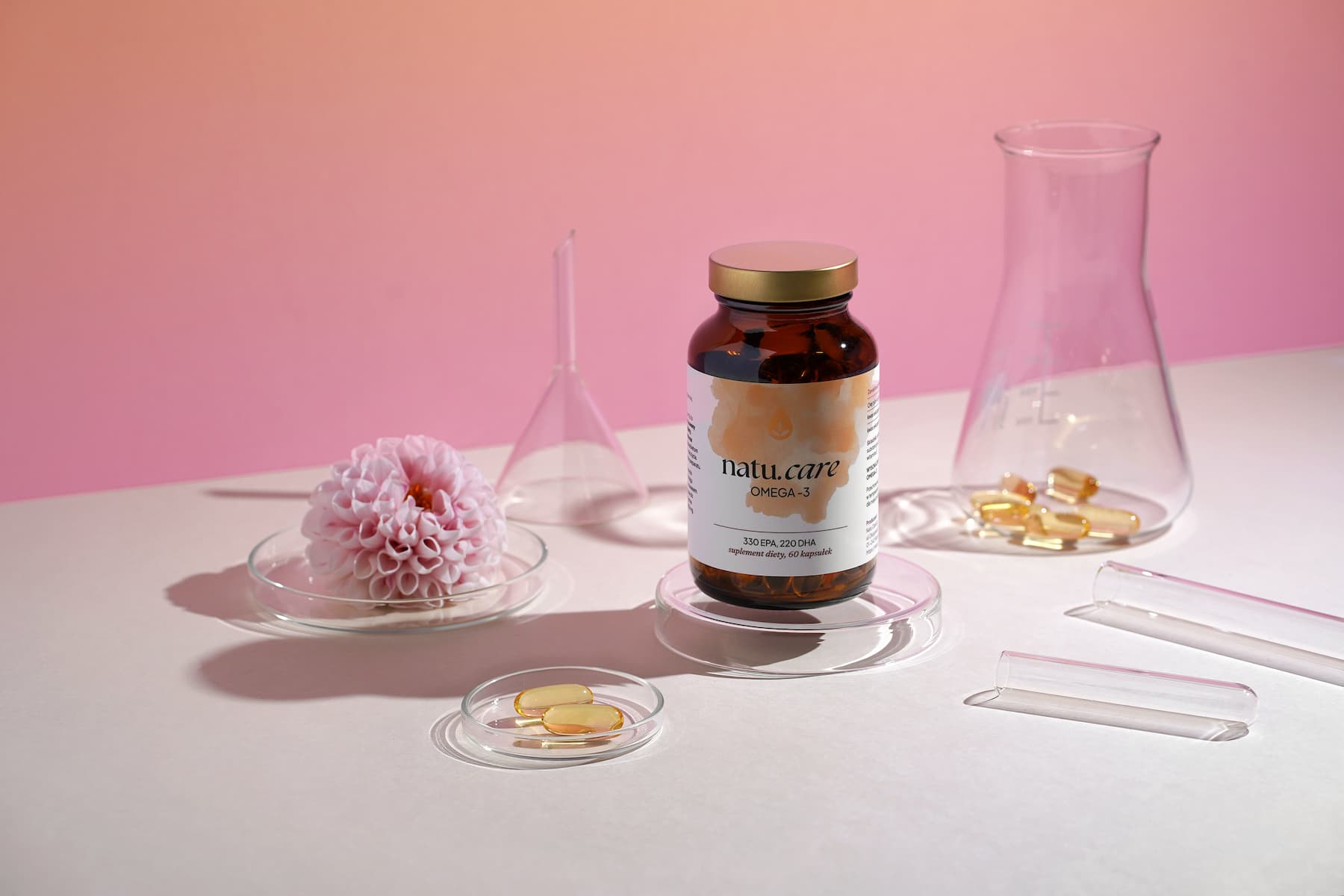
Omega-3 in a good dose and an optimum ratio of DHA and EPA acids will replenish valuable fats in the diet.
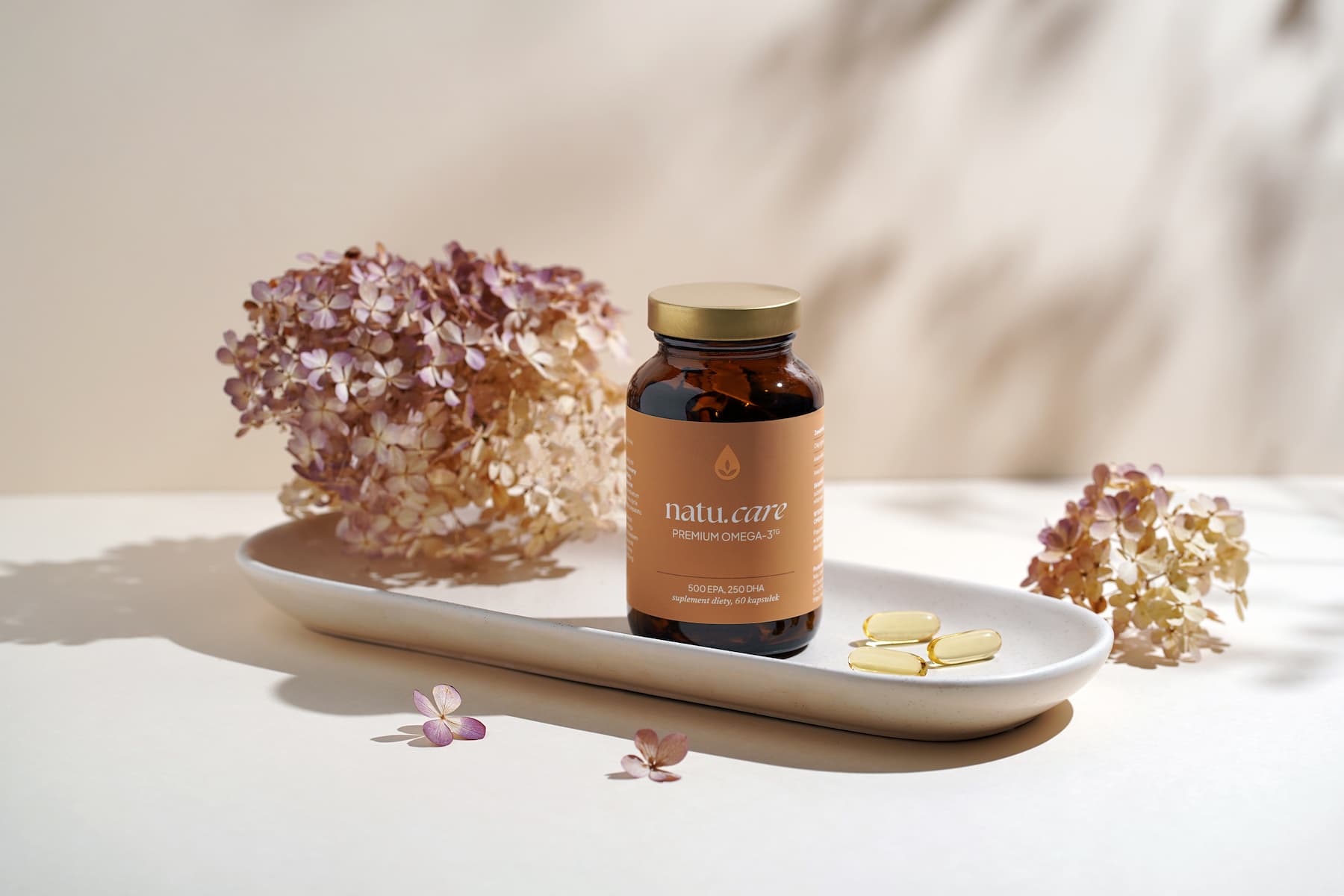
The omega-3 acids from Natu.Care are distinguished by their triglyceride form, which is characterised by high bioavailability.
